PREPARES FOR THE WORLD STAGE
BY JAMIE VALIS, PHD
Everyone has a role to play in the inclusion revolution and ending discrimination against people with intellectual disabilities. Strong Minds is one way Special Olympics breaks down the barriers to health for people with intellectual disabilities
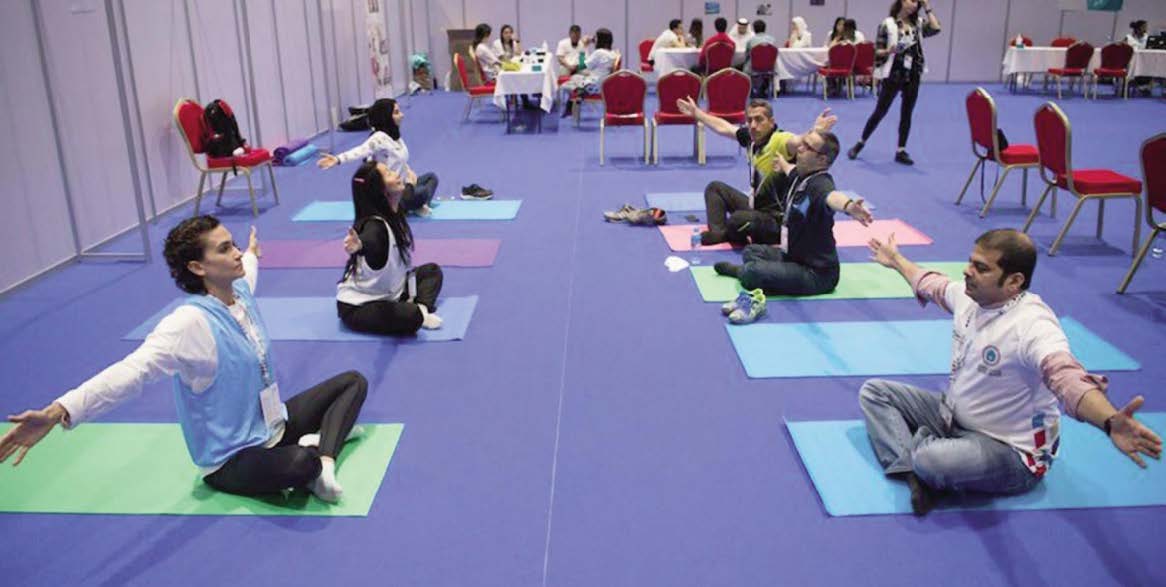
Grace Hamilton is ready. She has been preparing physically and emotionally for months with her basketball team. The 2019 Special Olympics World Games in the United Arab Emirates await.
The world will set its sights on Abu Dhabi as Hamilton and other top athletes from 192 countries will showcase their talents. Many competitors are preparing their minds as well as their bodies for this adventure of a lifetime. In such a thrilling environment, athletes will need to focus and actively manage the inherent stress that comes with competition on the world stage.
Hosted for the first time in the Middle East, the 2019 Special Olympics World Games will take place on March 14-21. The Games will be the world's largest humanitarian and sporting event of 2019 with 7,000 athletes competing in 24 sports and an estimated 500,000 spectators.
Emotional well-being is critical to performing, on and off the field. Unfortunately, emotional wellness is an area that is sometimes overlooked for athletes, including Special Olympics athletes. While many know the importance of physical fitness and a healthy body to achieve their goals, even the most-physically fit individuals cannot achieve their best when they are ill-equipped to manage the stress that comes with competition.
Studies have found that many individuals with intellectual and/or developmental disabilities have not had the opportunity to practice good coping skills in a variety of settings. Most common coping strategies employed by adults with intellectual and/or developmental disabilities are passive, and not active strategies. According to Alice Boyes, Ph.D., in Psychology Today, "Avoidance coping creates stress and anxiety, and ravages self-confidence."
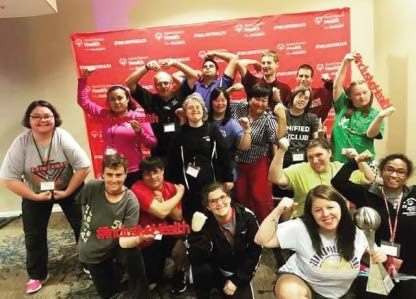
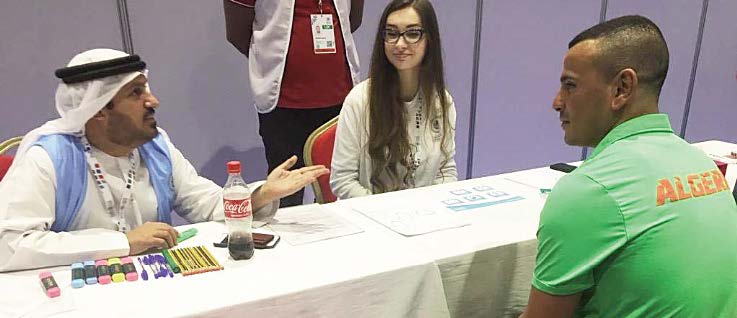
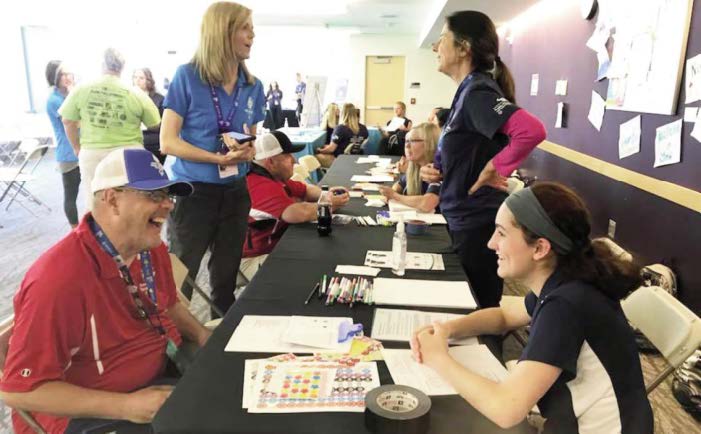
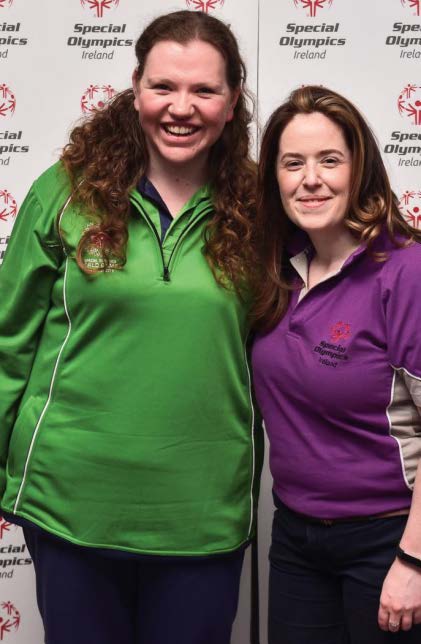
BODY AND MIND: (Opposite page) Athletes have the opportunity to develop active strategies for maintaining emotional wellness under stress during Strong Minds; (above, clockwise from top) Brandy (far left) is excited to teach her teammates about emotional well-being and performing at one's best on and off the field; More than 1,100 Special Olympics athletes and 50 clinical directors have joined Strong Minds' efforts; Grace Hamilton (left) and Cáit Donnelly encourage emotional wellness in competition and everyday life; Strong Minds features an opportunity for Special Olympics athletes to learn how to develop adaptive coping skills.
Special Olympics is working with athletes around the world to educate them about emotional wellness and empower them to use active coping strategies, which are associated with increased well-being.
In 2017, after several years of international piloting, Special Olympics launched a new focus on emotional wellness called Strong Minds. Strong Minds is the eighth discipline of Special Olympics Healthy Athletes®, made possible by the Golisano Foundation. It shows athletes how to develop adaptive coping skills and maintain emotional wellness in competition and everyday life. The content is derived from evidence-based models of self-regulation, social-emotional learning and mindfulness-based stress reduction.
Athletes learn coping strategies like deep breathing, thinking positive thoughts, releasing stress, and connecting with others, and after trying them out, they identify the strategies they plan to use in the future. Trained volunteers then provide visual aids for incorporating these individually-tailored techniques into their lives.
"[Strong Minds] relaxes me right down, I can feel all the stress and negative energy just going out through my fingertips - I can feel it just going down," reports Hamilton as she prepares for World Games.
Competition provides a natural opportunity to develop active strategies. To date, more than 1,100 Special Olympics athletes and 50 clinical directors have participated in Strong Minds. Athletes, families and volunteer professionals are embracing Strong Minds.
Brandy Peterson, a Special Olympics athlete and Health Messenger from Montana, shares, "My goal is to educate athletes, family members, coaches, volunteers and the community of our newest Healthy Athletes discipline Strong Minds. I really love doing this and working with the athletes on emotional wellness."
Special Olympics Ireland began offering Strong Minds in June 2018, catching the attention of the Minister for Health who visited Healthy Athletes. With 91 athletes slated to compete, Special Olympics Ireland continues to offer Strong Minds offerings to the delegation preparing for World Games. Strong Minds events have included workshops with athletes, whole team exercises, and coaches and management team involvement with much success.
"Strong Minds has had such a positive effect. It helps everyone to realize these exercises can not only be used in sporting environments but also are relevant to everyday life," shares Cáit Donnelly, the Health & Wellbeing Coordinator of Special Olympics Ireland.
Ireland is not alone in its focus on emotional wellness and physical fitness. In other areas, teams are actively preparing for World Games beyond the training field. For example, Special Olympics USA, with more than 200 competing athletes, will incorporate Strong Minds training into its send-off celebration in Newark, N.J.
Also, at the previous World Games in Austria, athletes such as James Richardson, a long-time Special Olympics athlete from Germany who medaled in the 5,000m and 10K cross country ski events, participated in the Strong Minds pilot. Richardson left with tools he could use: "[Strong Minds] helped me find a way to put my positive thoughts into words that I can then use to help me control stress when needed."
Strong Minds is an important new area of training for Special Olympics athletes, and its future is bright as plans include engaging health leaders in Strong Minds training, incorporating visual imagery into the field of play, and developing additional resources for athletes, caregivers and coaches.
In 1997, Special Olympics began offering free health screenings and education to Special Olympics athletes in a welcoming, fun environment called Healthy Athletes. Now, more than 270,000 health professionals and students have delivered over 2 million free health screenings to people with intellectual disabilities. These providers take these skills back to their practices and provide higher quality health care to people with intellectual disabilities – not just Special Olympics athletes – in their communities. In addition to Strong Minds, Healthy Athletes provides free health screenings in podiatry, physical therapy and fitness, audiology, vision, dentistry, better health and well-being, and sports physical exams.
Everyone has a role to play in the inclusion revolution and ending discrimination against people with intellectual disabilities. Strong Minds is one way Special Olympics breaks down the barriers to health for people with intellectual disabilities. You can demonstrate your commitment to creating a fully inclusive world by taking the Inclusion Pledge right now at JoinTheRevolution.org •
For more information about Special Olympics, Healthy Athletes and Strong Minds at specialolympics.org/health
ABOUT THE AUTHOR: Jamie Valis, PhD, is Senior Manager of Health Training, Special Olympics International.